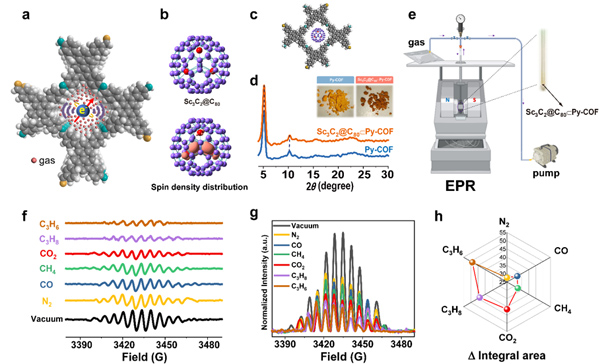Researchers Develop A Nano Spin Sensor for Probing the Gas Adsorption inside Porous Organic Frameworks
Recently, the use of electron spins for advanced science and technology has been actively pursued owing to their quantum characteristics. Among them, spin-based sensors have attracted considerable attention owing to their quantum sensing applications.
Molecular spins exhibit unique quantum properties, and certain proposals based on molecular spins for quantum computation and information storage have attracted considerable attention from physicists and chemists. Paramagnetic metallofullerenes are nanoscale ball-like molecules with sensitive electron spins, which can be potentially employed in quantum sensing applications.
Recently, Prof. Taishan Wang in Prof. Chunru Wang's group from the Institute of Chemistry of the Chinese Academy of Sciences developed a nano spin sensor based on a spin-active metallofullerene, Sc3C2@C80, for probing the gas adsorption inside porous organic frameworks.
Sc3C2@C80 was respectively embedded into the nanopore of a covalent organic framework (Py-COF) and a metal-organic framework (MOF-177). Electron paramagnetic resonance (EPR) spectroscopy recorded the EPR signals of Sc3C2@C80 within these two porous organic frameworks after adsorbing N2, CO, CH4, CO2, C3H6, and C3H8. Results indicated that the regularly changing EPR signals of embedded Sc3C2@C80 were associated with the gas adsorption performance of porous organic frameworks. Thus, the molecular
spins of metallofullerene can be employed to measure the gas adsorption performance of porous organic frameworks.
In contrast to traditional adsorption isotherm measurements, this implantable nano spin sensor could probe the gas adsorption with in situ, real-time monitoring.
EPR measurements using a nano spin sensor involving Sc3C2@C80 entrapped in a Py-COF were also employed to probe the emergence of C3H6 gas, demonstrating that metallofullerene-based molecular spins are applicable for sensing applications.
This study was published in Nature Communications.

Probing the gas adsorption performance of Py-COF using the molecularspin of Sc3C2@C80. (Image by Prof. WANG)
Contact:
Prof. WANG Taishan
Institute of Chemistry, Chinese Academy of Sciences
Email: wangtais@iccas.ac.cn





